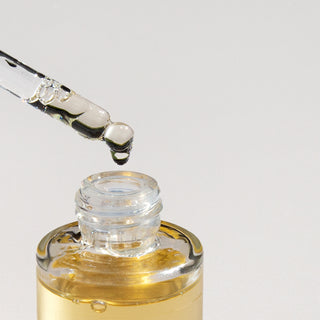If you're all about that skincare game, you've probably heard the buzz about face oils. They're like a secret weapon giving your skin a boost of hydration, nutrition, and protection. But hold up, there's a twist: not all oils are created equal. Picking the right one is the key to unlocking the magic.
Now, here's the scoop. We know the sea of options can be overwhelming. How do you even choose with so many oils out there? Well, say hello to our hero – Pure Marula Oil. It doesn’t clog pores because it is non-comedogenic. According to plastic surgeon, Dr. Ashton Kaidi, Marula Oil has over 50% more antioxidants than the leading oils that are currently in the market.
Choosing the better option might be confusing. But don’t worry, we’re here to guide you.
In this article, we're breaking it down, comparing it to other oils so you can decide the one that’s tailor-made for your skin.
What is Pure Marula Oil?
Pure Marula Oil is a natural, cold-pressed oil extracted from the seeds of the Marula fruit tree, from southern regions of Africa. For centuries, locals have been using it for its healing and beautifying properties.
According to Dr. Kaidi’s clinical trial of 24 patients with radiation exposed skin, here are the benefits Marula Oil offered:
Deep moisturisation. Studies have proven that Marula oil is great for hydrating and moisturising the skin. It's loaded with antioxidants and unique healing properties that are not found in other oils. Plus, it's super light and easily absorbs into your skin. It's got amino acids like L-arginine and fatty acids that work together to keep your skin hydrated and balanced at the right pH levels.
Also, Marula oil does something pretty neat – it forms a protective layer on your skin. This layer helps important nutrients sink in really well, making your face feel incredibly soft, flexible, and wonderfully radiant.
Protection from sun damage and free radicals. Marula oil is rich in antioxidants, vitamins E and C, and phenolic compounds. These team up to guard your skin against the harmful effects of UV rays and those pesky free radicals.
Also, Marula oil packs SIX TIMES more ascorbic acid (that's vitamin C) than oranges do. And you know what Vitamin C does? It pumps up your collagen!
Soothing for irritated, inflamed skin. The impressive thing about Marula oil? It's loaded with anti-inflammatory properties that are pure gold. So, if your skin is acting up with irritation, itchiness, or feeling dry, this oil swoops in like a hero.
In the clinical trial conducted by Dr. Kaidi involving patients exposed to radiation, Marula Oil displayed remarkable results. It effectively reversed redness, irritation, and skin dehydration, proving its exceptional capacity for healing and addressing sun damage, without irritation.
Pure Marula Oil vs. Other Skincare Oils
Convinced yet? Now, let's take a closer look at how our Pure Marula Oil compares to other popular skincare oils.
Now what is Jojoba Oil?
Jojoba Oil is extracted from a shrub. It grows in dry regions of northern Mexico and the southwestern US. Jojoba oil and wax are produced from the seeds and used for medicine.
Jojoba Oil offers the following benefits:
Reduction of Acne. Jojoba oil does a good job in reducing pimples, blackheads, and other face bumps. Some studies suggest that using a face mask with jojoba oil and clay often help with blackheads, whiteheads, and bumps. Plus, jojoba oil is non comedogenic, which means it does not clog the pores.
Scar Prevention, Wound Healing, and Sunburn Soothing. Jojoba oil is rich in vitamin E and works as an antioxidant, which can potentially help in avoiding scars. Moreover, it's believed that jojoba oil might also contribute to speedy wound healing.
Many people use jojoba oil to reduce sunburn signs and to protect their skin from sun damage. Vitamin E and the moisture of the oil soothe the symptoms of a burn and may promote healing.
Given its numerous assured advantages, it's no surprise that Jojoba oil is increasingly becoming a fundamental component in various skincare items.
Marula Oil vs. Jojoba Oil: Which Is Better For Your Skin Type?
Jojoba oil and Marula oil have several similarities. These oils both absorb rapidly into the skin and are non-greasy oils. They are highly concentrated with antioxidants that effectively fight free radicals.
Apart from these properties, both Jojoba and Marula oil closely resemble the oil that’s naturally produced by the skin. This means they can both effectively regulate sebum production by the skin. They make it possible for the skin to remain properly hydrated without being too oily.
However, our Pure Marula Oil has a higher concentration of antioxidants, such as Vitamin E, Vitamin C, amino acids and flavonoids. These antioxidants, as we know, protect our skin cells from free radicals that contribute to ageing. Therefore, it is more widely used for its anti-aging and healing benefits, helping to reduce the appearance of fine lines and wrinkles and improve skin elasticity.
On the other hand, Jojoba oil is typically favourable for oily and acne-prone skin, as it can help regulate sebum production and maintain a balanced complexion. It is also commonly used as a carrier oil for essential oils. Jojoba oil is also generally more affordable, as it is widely available. Marula oil is typically more expensive compared to Jojoba oil due to its limited geographic source and extraction process.
Now, Onto Rosehip Oil, What is it?
Rosehip oil is derived from the seeds of wild rose bushes.
A diverse range of wild roses exists, yet the optimal extraction is sourced from dog rose and sweetbriar varieties, particularly those flourishing in the Andes Mountains across Chile and Argentina.
Rosehip Oil offers the following benefits:
Reduces the signs of ageing. Rosehip oil contains massive amounts of potent nutrients that promote skin regeneration. It is rich in antioxidants called lutein and zeaxanthin. Combined with vitamin C, you get a triple treat that fights and protects the skin from ageing. Also, rosehip oil is abundant in vitamin E and natural retinoic acid. Both are essential in collagen production, which maintains the skin’s elasticity and firmness.
Brightens the skin and fades hyperpigmentation and scarring. The infusion of essential fatty acids and vitamins A, C, and E in rosehip oil helps to reduce pigmentation naturally. They repair damaged skin and provide protection without the sticky feel.
Marula Oil vs. Rosehip Oil: Which Is Better For Your Skin Type?
Before deciding which oil is better, here’s a comprehensive comparison. Because both of these oils are relatively versatile, they have become incredibly popular. They are both easy to use and readily available. In addition, both marula and rosehip oil have been tested thoroughly and have been found to be effective in a number of ways. Some of the key benefits that Marula oil and Rosehip oil provide include:
Both oils are effective in moisturising dry skin. Because the oils are incredibly smooth, they absorb into the skin relatively quickly.
Both oils are able to rejuvenate damaged skin, thanks to their relatively high concentration of antioxidants
Even though the oils are not recommended specifically for chronic skin conditions, those who are suffering from generalised inflammation or irritation find that these oils are able to soothe the skin quickly.
Anyone who is suffering from a skin rash may be able to treat this rash by using Rosehip oil or Marula oil
Additionally, Marula oil's comedogenic rating is lower than that of rosehip oil, making it a suitable option for a wider range of skin types, including oily and acne-prone skin. This lower likelihood of clogging pores adds to its appeal.
While both oils offer remarkable benefits, Marula oil's unique combination of qualities - from its lightweight texture, to its powerful antioxidant properties, to its neutral scent, positions it as a favourable choice for seamlessly integrating into any skincare routine.
Now, What is Argan Oil?
Argan oil is made from the kernel of the Argan tree, which is native to Morocco. It’s commonly referred to as Moroccan oil since it originates from Morocco.
Argan Oil offers the following benefits:
Rich in fatty acids such as linoleic acids, oleic acid, and palmitic acid to hydrate and nourish the skin.
Argan oil contains vitamin E which helps the skin retain moisture and helps soothe and heal the skin.
Squalene hydrates and softens skin to help prevent wrinkles and fine lines.
It hydrates skin without leading to excess oiliness, fights free radicals, and offers anti-aging benefits.
Marula Oil vs. Argan Oil: Which One Is Better?
Argan Oil is also a popular skincare oil that's known for its moisturising and anti-inflammatory properties. Both Marula oil and Argan oil offer a wide range of skin benefits. They both help with anti-aging, soothe skin, hydrate, are rich in antioxidants, and have anti-inflammatory properties. Argan oil is great for dry skin too but it doesn’t offer the deep hydration that Marula oil offers.
Our Pure Marula Oil has a lighter texture and is quickly absorbed by the skin, making it a better choice for daytime use. Studies have shown that Marula oil is a non-irritating, safe choice for most, if not all skin types.
Now, Coconut Oil, Should I Use It?
Coconut oil can hydrate the skin and help it retain moisture. It may also help reduce inflammation, promote wound healing, and have antibacterial properties.
Coconut Oil surprisingly offers the following benefits:
According to recent studies, Coconut oil offers:
- moisturising dry skin, including in people with conditions such as eczema
- reducing inflammation, which may result from UVB rays
- promoting wound healing
- antibacterial, antifungal, and antiviral properties
One study found that coconut oil might help prevent and treat rashes, such as atopic dermatitis. Another study showed that coconut oil extract could improve the barrier function of the skin and reduce inflammation due to UVB rays.
Marula Oil vs. Coconut Oil: Which One Should You Use?
In the world of skincare, Marula oil and Coconut oil are two popular contenders, each with its unique strengths. They share common benefits, like moisturising and soothing properties. Both oils hydrate the skin well and offer relief to irritated skin.
However, Marula oil has a few advantages worth noting. It's a speedy hydrator with a lightweight feel, while coconut oil can leave a greasy residue. Marula oil packs a stronger antioxidant punch, thanks to vitamins E and C, providing better protection from environmental stressors. It also won't clog pores as easily as Coconut oil, making it a friendlier option for different skin types, including those prone to breakouts. Additionally, Marula oil's neutral scent appeals to sensitive noses.
In a nutshell, while both oils have their merits, Marula oil's quick absorption, powerful antioxidants, and compatibility with various skin types make it a top-notch choice for nourishing and revitalising your skin.
Our Conclusion..
While there are many skincare oils to choose from, our Pure Marula Oil stands head and shoulders above other skincare oils, thanks to its exceptional qualities and unmatched benefits for your skin. Its nutrient-rich composition, exceptional antioxidant power, anti-inflammatory properties, non-comedogenic nature, and commitment to quality and sustainability make it the ultimate choice for transforming your skin.
Sources:
Dr. Ashton Kaidi, Co-Founder of Marula Beauty
https://www.trendhunter.com/trends/dr-ashton-kaidi
https://open.spotify.com/episode/51m1hgavhSwyGzoF3wM7b3?si=rkH7K1Q0QYCHfZE4NfYv9Q&nd=1
Marula Oil Benefits, Uses
Anti-aging potential of extracts from Sclerocarya birrea
https://www.ncbi.nlm.nih.gov/pmc/articles/PMC5804067/
The Potential of Plant Phenolics in Prevention and Therapy of Skin Disorders
https://www.ncbi.nlm.nih.gov/pmc/articles/PMC4783894/#:~:text=Due%20to%20their%20natural%20origin,damage,%20including%20wounds%20and%20burns.
Jojoba Oil, Uses, Side Effects, and More
Safety and efficacy of Sclerocarya birrea (A.Rich.) Hochst (Marula) oil: A clinical perspective
https://www.sciencedirect.com/science/article/abs/pii/S0378874115301963?via%3Dihub
Benefits of coconut oil for the skin
https://www.medicalnewstoday.com/articles/coconut-oil-good-for-skin#benefits
Health Effects of Coconut Oil-A Narrative Review of Current Evidence
https://pubmed.ncbi.nlm.nih.gov/30395784/
Enhanced barrier functions and anti-inflammatory effect of cultured coconut extract on human skin


